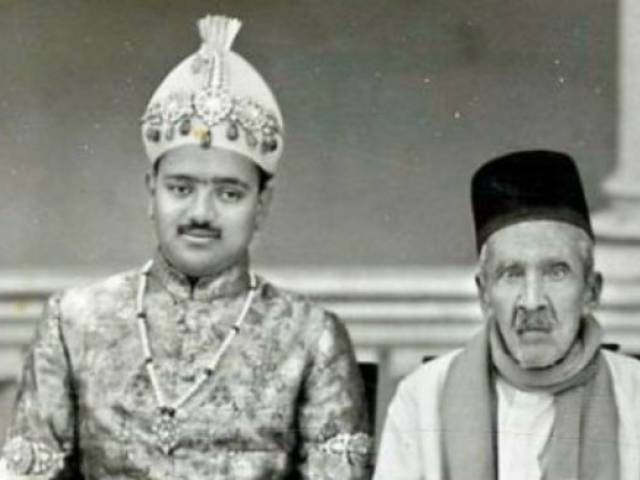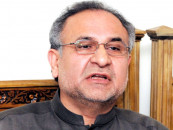Pakistan loses decades-old Hyderabad Fund case
UK court rules in favour of heirs of the Nizam of Hyderabad, India

A file photo of Nawab Imdad Jah, left, with his father Nizam VII Mir Osman Ali Khan.
The UK court has ruled in favour of the heirs of the Nizam of Hyderabad and India, stating that "there is no illegality alleged that is sufficient to cause this Court to prevent the Princes -- specifically, India -- from asserting her claim to the Fund."
The high court dismissed Pakistan's claim to a sum of £35 million fund held by the UK National Westminster Bank in an account held in the name of Pakistan's former high commissioner, Habib Rahimtoola since September 1948.
The proceedings were started in 2013 when the then Pakistani high commission Wajid Shamsul Hassan had waived Pakistan's immunity and filed claim.
The high commission had gone against the Foreign Office that was not in favour of waiving the immunity in the matter. So, for the first time in the legal proceedings, Pakistan claimed of a beneficial interest in the fund.
The princes of Nizam and India disputed Pakistan's claim to be absolutely entitled to the fund. They contended that there was no absolute transfer to Pakistan but that Nizam VII retained the beneficial interest in the fund and that a trust arose.
The princes and India also said that the transfer was to Rahimtoola in his personal capacity and that Pakistan had no interest – not even a legal interest – in the fund.
In short, the princes and India asserted that the fund was held on trust by Rahimtoola in his personal capacity alternatively in his capacity as the Pakistani high commissioner.
On the other hand, Pakistan's leading lawyer Khawar Qureshi has failed in establishing his point that Nizam had transferred the money in the purchase of weapons in order to resist India's attempts to forcibly annex Hyderabad.
"I do not consider that the transfer had anything to do with the purchase of weapons or the compensation of Pakistan (in any way) for the purchase of weapons.
"The purpose of the transfer was, as I have found it, entirely different. For these reasons, I reject the Arms for Money Argument," says the judgment authored by Justice Marcus Smith.
The judge also noted that there was no demand or request from Pakistan that the money be transferred since 1948.
"If there was substance in the Arms for Money Argument, Pakistan would have at least requested -- and perhaps demanded --- the transfer," says the judgment.
The court also held that the fund was held by Pakistan through her high commissioner in the United Kingdom on trust for Nizam VII and his successors in title.
"The fund was not held by Rahimtoola personally, nor did either Pakistan or Rahimtoola have any beneficial interest in the Fund."
The judgment also noted that Pakistan's contentions of non-justiciability by reason of the foreign act of state doctrine and non-enforceability on grounds of illegality both fail.
In the circumstances, the UK high court held that Nizam VII was beneficially entitled to the fund and those claiming in right of Nizam VII – the princes and India – are entitled to have the sum paid out to their order.
Foreign Office
The Foreign Office announced that Pakistan was closely examining all aspects of the detailed judgment and would take further action in light of legal advice.
"Pakistan has taken note of the judgment by the high courts of justice of the UK in the Hyderabad Fund case, today, after a 2 weeks trial in June 2019.
"The judgment rejects the longstanding claims of the two major parties and upholds the claims of the heirs of Nizam of Hyderabad," read an Foreign Office statement.
"The ruling does not take into account the historical context of the transfer when India illegally annexed Hyderabad in violation of International Law and all civilised norms, leading the Nizam of Hyderabad to make desperate efforts to defend his people and the state from the Indian invasion," it further stated.
"The Nizam also raised the matter with the UN Security Council where the issue remains on the agenda to date. The Nizam, as a sovereign, approached Pakistan for assistance which the Government of Pakistan provided."



1724319076-0/Untitled-design-(5)1724319076-0-208x130.webp)















COMMENTS
Comments are moderated and generally will be posted if they are on-topic and not abusive.
For more information, please see our Comments FAQ